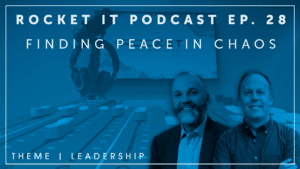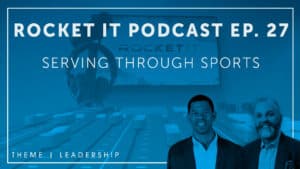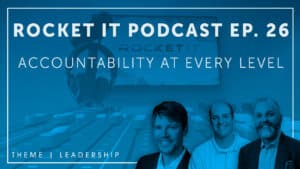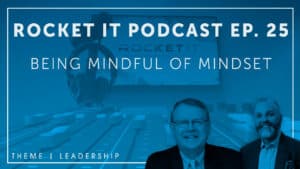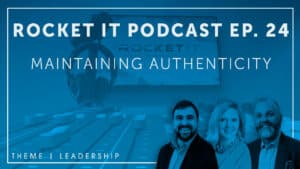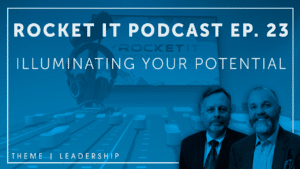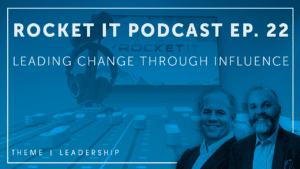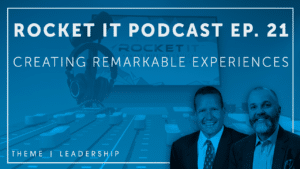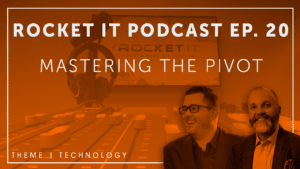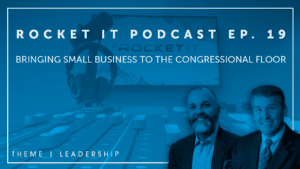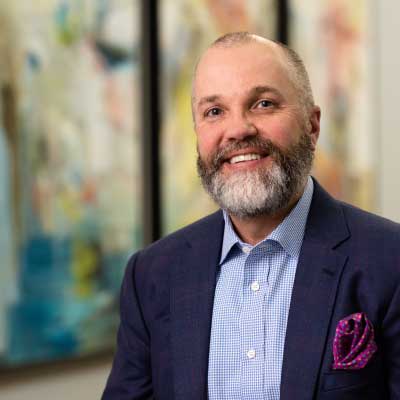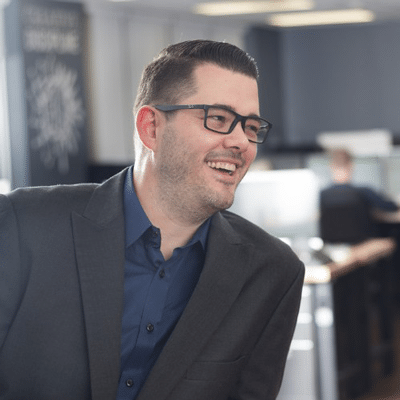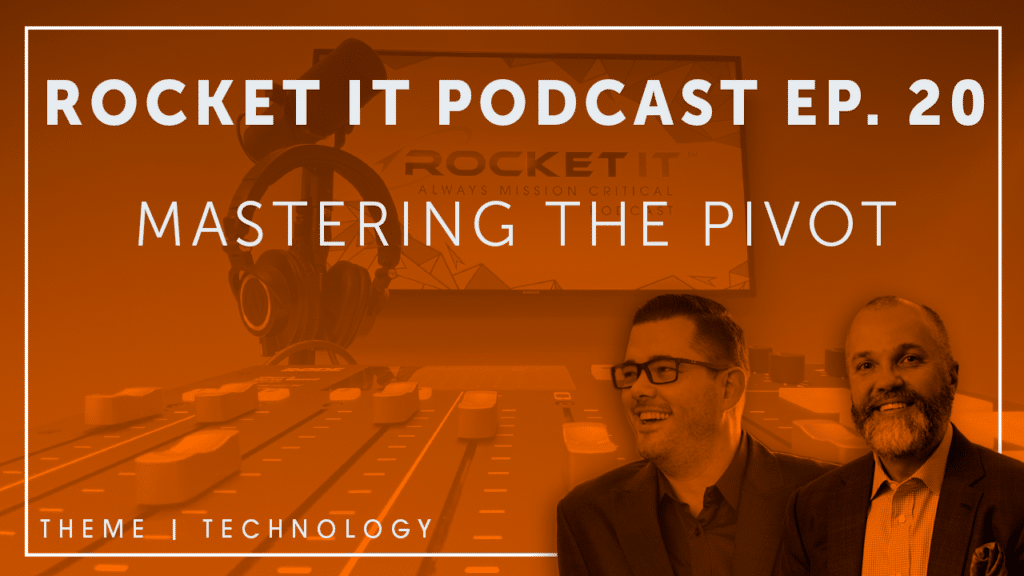
Rocket IT Business Podcast | Craig Haynie | Mastering the Pivot | Ep. 20

With a constant drive to innovate and tackle new challenges, CablesandKits CEO, Craig Haynie has become a master of building businesses; helping his online business grow and overcome various challenges since its launch in 2001. And now, in the wake of the COVID pandemic, Craig has once again found new ways to build on the impressive capabilities of his team and online platform.
In This Episode, You’ll Hear More About:
- How to launch an ecommerce site
- How to break the mold of the traditional CEO
- The definition of a “Craigism”
- How to create visibility, accountability, and sustainability
- The role of innovation in helping a business scale with customer demand
- What CablesandKits has done to assist with the recent pandemic
- Market opportunities the pandemic has created
- How to overcome large challenges
- The impact of sending out daily emails to customers
- How to run a successful business while remaining involved in family life
- How to deploy a leadership team and what it takes to lead one
- How to maximize the potential of a team and its processes
- Why entrepreneurs should consider working with mentors
Contact Information
Craig Haynie | craig@cablesandkits.com
Resources Mentioned
CablesandKits Newsletter Signup (Bottom Footer)
Podcast with Chad Merrill and FCCI
Host: Matt Hyatt Guest: Craig Haynie
Show Notes
Matt Hyatt (00:00:00):
Greetings and welcome to episode 20 of the Rocket IT Business Podcast. My name is Matt Hyatt, and I’ll be your host today, as we get to know entrepreneur extraordinary and my close friend, Craig Haynie
Intro (00:00:25):
[Music Plays]
Matt Hyatt (00:00:25):
With a constant drive to innovate and tackle new challenges. Craig has become a master at building businesses, helping his online business grow and overcome various challenges since its launch in 2001. And now in the wake of the COVID pandemic, Craig has once again, found new ways to build on the impressive capabilities of his team and online platform. Craig, welcome to the show. Glad you’re here.
Craig Haynie (00:00:48):
Thanks for having me. This is pretty cool.
Matt Hyatt (00:00:50):
Awesome. So let’s dive right in. Tell us, tell us a little bit about Cables and Kits. That’s that’s the business that you were running when when I first met you probably 10, 15 years ago. And tell us a little bit about that business and the background.
Craig Haynie (00:01:04):
Sure. So I have a technology background from, from the early days I started a dial up internet service provider back in 1999 and was a part of a few others before that took a high-tech job in Northern Virginia back right before the dot-com crash. When the dot-com crash happened, I found myself jobless, and obviously you know, being an entrepreneur minded and wired person I was looking for for something to do. And so I fell backwards into the business of buying and selling pre-owned Cisco networking equipment, buying it used and, you know, dusting it off and, and getting it going and selling it. And I did that in the early days. And since then it obviously matured and we, and other companies like us have built kind of an association that we’re all a part of. And you know, now, about 2019 to 20 years later, we’re you know, a significant and well-recognized part of of it.
Craig Haynie (00:02:02):
And so that’s how it began. About three years in after selling pre-owned Cisco, I just on a whim looked into e-commerce. It was, it wasn’t brand new. But if you think about what e-commerce was around in 2003, 2004, I mean, you had eBay and some early things, but you didn’t, it wasn’t certainly as significant as it is today. So I was intrigued by that downloaded and installed an open source shopping cart platform and started tinkering with it and literally said, well, you know, what can I throw together on this play website that I’m doing? And I had a box of rack mount kits and console cables, and I was like, I don’t know, Cables and Kits. And I went and registered the domain, threw it together and was tinkering about three months later after not logging into the admin section of the site for quite a while. I logged in and there were three orders there. And I said, where in the world did these orders come? So, because I had not advertised or anything, it was just it was a play toy. And so we contacted those, or I contacted those people and apologized for the delay and ship them the product that they had bought for free, because it was just stuff in a box. And I said, there’s something here. So I started focusing on it, working on it. And that was one of the first, well, not the first, but one of the the major times in this era where I worked, you know, 16, 18 hour days till three and four o’clock in the morning, you know, just pounding away at figuring out how to develop in PHP and adding products to the website, sourcing them. And so I created a bonafide e-commerce website that primarily focused on Cisco accessories, rack, Mount kits, configuration cables, power cords, replacement parts, and the Cisco hardware.
Craig Haynie (00:03:54):
Wasn’t a part of that until much later. So that just took off. I mean, we, we over a 13 year period, we grew, you know, an average of a million dollars a year in revenue for 13 years in a row. And just, it was like a rollercoaster ride. So that’s, that’s kinda how it came to be somewhere in there. We added Cisco hardware back in and onto the website. We were one of the first to sell pre-owned Cisco via e-commerce. And for those that don’t know, a lot of the times with pre-owned Cisco, you can buy it new, or you can buy the exact same products, reset to factory specs for 50% less than what you would pay for new. There’s a few little limitations that you have to understand, but for the most part, for the average medium or even enterprise business, it’s a great option.
Craig Haynie (00:04:41):
So when we added that, it was really received well, business started taking off in that as well. And then, since then, I would say that we’ve matured to a place now where we would consider ourselves to be more passionate and more capable around sourcing and building products in China or other parts of Asia, or in some cases in the U.S. Where we can drive down the cost of a highly commoditized product, like ethernet, fiber, optic, cabling, power, cabling, racking. And so we’re, we’re more now around the manufactured side of things. We still have a huge business in pre-owned Cisco, and we will continue to focus on that. But now, instead of selling random things, we have a very intentional purpose around network infrastructure as a whole. So in a big, long couple of breaths, that’s who we are and more.
Matt Hyatt (00:05:34):
Well, so really amazing. You don’t hear too many products type businesses that can grow a million dollars a year over a long period of time, pretty consistently. And and I know you do have a really great business there, and we’re going to dive into a couple of those things pretty quick here, but I do want, I want to go back just a little bit. You said you fell backwards into the business. How does one do that for our listeners who may not have had the pleasure of falling backwards into a multi-million dollar business? How did that happen? Exactly. And what were the circumstances around it?
Craig Haynie (00:06:12):
Sure. So first I’ll start with the lesson. I think that the lesson in what I’m about to say is you always have to keep your eyes open for what could be in whatever situation you find yourself in the middle of. And I know that you wanted to talk about safety supplies later on, and that’s a really good example of the same thing. And so we’ll get to that. But, so what happened was I had owned a dial-up internet service provider that failed, and I had some hardware that was left over from that internet provider, a Cisco switch, as well as a couple of modem banks. So back in the day with dial-up you had a device that had 96 modems built into it on chip sets, and then you had T-1s or PRI lines coming into that thing. And you could, you could have 96 concurrent dial-up sessions. So,
Matt Hyatt (00:07:07):
Gosh, I love it when you talk nerdy, some good stuff. You’re bringing a tear to my eye, just remembering the days, you know, mid nineties type technologies.
Craig Haynie (00:07:19):
Here’s a funny side story is I had to call a send one day for something, and you get the auto-attendant, you know, thank you for calling us in technology, whatever, whatever. Well, I press something and press something else. And then I hear, thank you for calling us in technologies. You know, how can I help you? And I’m like, I thought it was the auto attendant. She said, hello? I said, are you the lady that does the auto attendant? She said, yeah. And I thought it was the funniest thing, because I had called so many times and had never spoken to her and to actually get this person on the phone was just mind blowing. But anyway, yeah, so I had these modem banks. I had this router, or that you want a router and a switch. And it was a couple of years after the failure of the dot-com or the dial-up.
Craig Haynie (00:08:05):
And I went to sell this hardware for cash. I was working a job and I went to sell this hardware, found a guy in California that offered to buy it. And he just kept dilly dally and dilly-dally and dilly-dallying well, I was working at a computer component distributor at the time. And I had a customer that was building some servers for a customer of his, who was starting a dial up internet service provider. And I said, hey, tell your customer to call me. I have these devices he’s going to need. And the guy called me and I sold him the devices and drove him down there, delivered them, got a check, and I was happy. The very next day, the guy that I had been talking to in California called and said, hey, I’m ready. My customer needs them. I’m ready. And I felt bad because I had committed to sell them to him, but I didn’t feel bad because he had drug around and you know, it is what it is.
Craig Haynie (00:09:04):
But I did feel bad. I turned to the, to the, the guy that worked to my right. And I said, hey, I know where to buy another one of these at. I think I had found it on eBay. And I said, I know where to buy another one of these things. Should I buy it and sell it to him so that he has what he needs? And he’s like, no, to heck with the guy. And I thought, you know what, no I’m going to do what I thought was the right thing. Even though it was probably a little bit above and beyond. And so I went and bought this thing and I said, okay, I’ve got you one. He said, can you ship it directly to my customer in North Carolina? So he’s in California, customers, North Carolina turned to the guy to my right, at my job and he says no way, you know, cause the guy was going to overnight me after the fact. But I did it anyway. So I sent the thing and the check didn’t come. And the next day the check didn’t come and I’m calling and calling and the check didn’t come. So finally I got in my car and drove to the address that I shipped it to. And I walked in from from Atlanta. It was like a six hour trip to wherever it was. It was outside of Charlotte. And so I drove there and walked in the front door and I said, I need to speak to this lady. And they walked me to her office and there was the equipment sitting on her credenza. And I said, you know, before I could open my mouth, she said the guy’s been emailing me 15 times a day asking for the serial numbers off the device so that he can run it through his ERP. And then, you know, create an invoice, create a PO yada, yada yada. And I said, well, I’ll read them off to you. So she sent them all back. So then she said, hi, do you want to have a cup of coffee? Sure. So we walked down the sidewalk to a coffee shop, had a cup of coffee. And she said, she assumed that I was her vendor’s vendor. Well, I suppose in a sense I was, but not in the way that she thought, but she said, you know, I’d like to give you, I appreciate your, you know, your passion, your persistence. She said, I’d like to give you all my business for these.
Craig Haynie (00:11:12):
Can you get me 10 of them? And I said, and I actually, I knew where to get 10 of them. And I said, yes, I said, but you know, I haven’t been in business very long, like 10 seconds. So I don’t have a lot of working capital. I’ll prepay you with wire transfers. Okay. So before I got home, I had $60,000 sitting in my account, $14,000 of which was profit. And so while I was at her office, she said, you’re on the list, right? And I’m like, what’s the list. It was an email list server of about 300 other companies that were buying and selling pre-owned networking. So I’m on the list. I’ve got $14,000 in profit sitting in my account. I quit my job on the way home. And I sat there behind my computer and I literally watched, it was like the matrix, all the numbers falling.
Craig Haynie (00:12:07):
It was email after email, after email, want to buy, want to buy want to sell, want to buy. There were so many people that wanted to buy things because they had sold them to their customers. They didn’t have time to even read the emails, to see if somebody had what they needed. There were so many people that were finding hardware from failed dot-coms that they didn’t have time to look for buyers. So both of them were just posting, want to buys and want to sales. And neither one of them were looking at the other email. So, I mean, and that was a dramatization, but I sat there and literally would look at a want to buy. I would scroll down a few days find a want to sell, haggle a deal with them and with the other people and that’s what our industry refers to as a tween, I would tween the deal.
Craig Haynie (00:12:54):
And so then I started looking on eBay and finding hardware. And then I started finding these IT administrators that had stacks of stuff in their server rooms that were, that was unused and started building a network of sources. So I was finding this hardware and then selling it to these other brokers who had relationships with end-user customers looking to save money on their it. And then as I said, earlier, things progressed where I started Cables and Kits, the website. And then I added the pre-owned hardware to the site. And ultimately I flipped it around where I was selling more hardware to the end-user customers that I was buying. And so I started becoming a customer of these other dealers in the market. And so to this day, we’re one of the largest consumers of that market of other brokers.
Craig Haynie (00:13:46):
We buy more from them than probably any other single than any other single customer does. And we just move a massive volume. That’s kind of how it happened. And so the point is, like I said earlier, is, you know, being in a situation and making the most of that situation, looking for that, for that opportunity and looking for that thing where you can, you can turn it into something. And so when I was sitting there having coffee and I knew that she was unhappy with her previous vendor, I knew that she had a demand. I knew where the supply was at and she was willing to make me her vendor. How do you turn that down?
Matt Hyatt (00:14:22):
I have to know. So obviously, to pull something like that off you graduated top of your class in high school, went on to get an MBA, had five to 10 years of experience in e-commerce software development. Right. I mean, how does the path of how all that work?
Craig Haynie (00:14:47):
Yeah. Well, I would love to say that, but then on the hand, I love not saying that I barely escaped ninth grade.
Craig Haynie (00:14:58):
I was raised by a single mom in a trailer park, very poor, power getting cut off, you know. Often my grandfather driving down from, from middle Georgia down to South Georgia, where I’m from, you know, on occasion topping off the power bill, and bringing sacks of food down. In school I had ratty clothes. I got made fun of, I got bullied and didn’t do well in school. I realized later that I’ve not been diagnosed per se, but I’m sure I have some sort of learning disability, probably dyslexia or something. When I read something, I have to read the same sentence two or three times to comprehend it, versus when I hear it, I comprehend it immediately. And so something there that I didn’t understand at the time, so I wasn’t good at school. You know, bullied, beat up, not beat up, just bullied.
Craig Haynie (00:16:01):
And and so, you know, in ninth grade I had just absolutely had enough of all of it. I didn’t realize it at the time, but it was being tired of my entire life. Not, not just school and not just bullying and not just not doing well, but just the whole thing. And so I quit and my mom technically put me in homeschool, which meant absolutely nothing. And nothing happened there. I went and got a job at McDonald’s at 15 years old and worked full time, 40 hours a week from seven to three of the day shift. I was the only young person on day shift there. And I did that job for, for a little while and then ultimately got a different job. And then I think I went to Walmart for a little while. And then I ended up landing in this dial up internet service provider as a tech support guy also because of one of those stories where an opportunity presented itself.
Craig Haynie (00:16:54):
And I just grabbed a hold of it real quick. I’ll make this quick. I used to go to the skating rink all the time and the DJ, I would stay in there and hang out and talk to him while, you know, just while skating. And he was a computer guy, real smart. And I had an uncle that had an Apple Mac LC2, a Macintosh LC2. And this friend at the skating rink said, you know a lot about Macs, right? And I was like, well, yeah. And I mean, I knew how to use it. He said, well, I just got a job at the very first dial-up internet service provider in town. I’m going to get you a job to be our Mac guy for tech support. I’m like, okay, thinking nothing’s going to come of this. Well I get a phone call a few weeks later from the owner saying, I’ve heard everything I need to hear. You’re hired. When can you start? And I’m like, oh wow. I started and the first few weeks I’m like doing my best to figure out what I was supposed to even know, but I figured it out and you know, got pretty good at it and was you know, it was very helpful. And then I went on to another internet provider that I was partners in quasi partners in, and that’s a whole nother story for another day. And then I left there and started my own dial-up internet provider then went to a work for a tech company in Virginia, and then started at Lantech, which then became Cables and Kits. So that, yeah, that’s my history and my story. So yeah, there’s no education there at all. I think I was just born as an entrepreneur. I think a lot of people are wired that way and I’m one of those people. And, and so everything that I’ve learned, I’ve just learned kind of on the job.
Matt Hyatt (00:18:31):
I love it. I love it. You and I have a lot of parallels. I was a terrible student, also dropped out of college. I long considered myself, sort of unemployable, but I love that story. So one of the things that I think our listeners will pick up on is sometimes you have sort of a unique view of things and and sort of looking at the world a little differently than your average bear. There’s a word for it. I’ve heard Craigism. What is a Craigism? What is that?
Craig Haynie (00:19:08):
Well, you know, I, my mind just jumped ahead. Three chapters. There’s a core value of ours right now. That is why, why, why does your mind blank when this happens? There’s a core value of ours right now called build processes that don’t fail. And what I like to do is when I’m interacting with something, I really want to do it in a way, wire it up in a way where it’s going to last and it’s, it’s not going to just fall apart or fade off into the background as the years have went on. I’ve come to understand that about myself years and years and years ago, I didn’t understand that about myself, but I didn’t have these compulsion’s or I did have these drives and these desires to do things in a certain way. So early on when I would encounter a situation that seemed like it might’ve been difficult to solve, or there was a lesson in it, I would in just mid sentence, I would say something. And I would say, Whoa, wait a minute. That phrase really encapsulates how I feel about this. And I would write it on a whiteboard and I wrote about 12 or 15 of them on this whiteboard. And then somebody started calling them Craigisms, because they’re, you know, things that Craig says. And so we, you know, we still call them Craigisms and there’s, I don’t know, 18 to 20 of them now. So I was in the middle of a conversation with someone one time, and they were talking about having a problem with a coworker and you could see the fire in their eyes, and they really wanted to march them to the door. And, you know, and ultimately what we learned in this conversation with one another was that this behavior in this coworker was usual. And it had been going on for several weeks, but, you know, the several years before it was, were different. And I said, I think the first thing you need to do is seek to understand why they are acting differently now than they did previously. And the words seek to understand ended up on the whiteboard as a Craigism.
Craig Haynie (00:21:24):
And so now what we, what we do is we say, if you’re in a situation that seems abnormal or seems out of place, seek to understand, seek to understand what variables are causing it, what variables have changed, why that person is acting the way they’re acting.
Craig Haynie (00:21:41):
And so it, it’s something that we can quickly call up the middle of the meeting. Well, duh, seek to understand and keep moving, because everybody knows what that means. You know, another one is create capacity. You know, I forget exactly what the origin of that was, but we were in a situation where we where we did something, and there was an opportunity to do it way number one, or way number two. Number one would have taken two hours to do, while number two would have taken two hours and 20 minutes to do, but if we’d have done it way number two, then it would have laid a foundation or a groundwork and given the ability to build on that or create some additional capacity down the road. And so, the idea of that Craigism is when you’re faced with a decision about how to go about doing something, or when you’re making a hiring decision, or when you’re making a technology decision, I can talk forever about those, try to do it in a way that creates capacity for growth or creates capacity for additional efficiencies. As you have time to put toward them. One last thing on this one, it’s not always about capturing the capacity and really, truly that particular phrase is not about that. It’s about creating the ability for the capacity. So that later, when you get a moment, you have somewhere to put the capacity or you have some way to build it. So that’s one. Operational Excellence. Oh, here’s one to solve the problem and deal with the interface efficiencies. So what that would mean is when you’re in the midst of a situation or a problem, you don’t always have to stop and figure out and unwind, why did this happen? How are we going to prevent it in the future? Especially if it’s customer facing, just deal with the problem, right? That moment, make a note, put it on a to-do list and then come back around at an appropriate time and deal with the inefficiency, how you’re dealing with that particular issue. And I’ve got an example, but I won’t go into it because it’s probably too long. But so that’s just a few examples of them. And there’s like I said, 18 to 20 of them, you know? And one last one, a thousand little things, we were talking one day and I forget how it came up, but we were talking about what creates success. And they’re like, what’s this one thing that we need to do. I said, there’s no one thing. You may make one good decision that takes you in a particular direction, but it’s a thousand little things. It’s a thousand little decisions and small things that all end up aggregating together to create a large outcome.
Craig Haynie (00:24:31):
And so when that particular Craigism might come up when somebody is facing a problem, that to me is obviously a lot of small problems rolled up into one and they’re trying to put one big label on it. I said, it’s not, you don’t have one problem. You’ve got a thousand little problems and you need to take and start chipping away at those little problems until you can see a few bigger problems. But if you’ve got a cluttered space, sometimes you may have to just empty the room, right? Maybe part of the problem is not being able to see the room. And so you can’t start thinking about shelving when you, when you have all this clutter that stands in the way of even seeing what space you have to work with. So that’s an example of that one. I get passionate about these things I could see.
Matt Hyatt (00:25:22):
I love it. So, you know, Ray Daleo has his book principles, when’s the Craigism book coming out.
Craig Haynie (00:25:30):
Well, you know, there, there’s a lot of different ideals and you know, list of things. I can’t find a fancy word for it, that, we have something called benign things. We have something called the plan for success. We have the Craigisms, we have our core values. Obviously we have all these other, these other elements that, that have been our realization of, of how to modify in words, the way that we go about things, or the reason that we go about things or the guiding principles to how we do things. And I have thought over the last couple of years that, you know, no rush, but there might come a time when it would make sense to take some of that and put it into a book. Yeah, I love it, but not my, not my number one focus.
Craig Haynie (00:26:19):
I enjoy the process of continuing to refine it. And I love it when you can see things start working together, like you’ll have the Craigisms and then you might have the plan for success. And through those, you start seeing how they start inner intertwining and weaving together. And you’re like, wow, I think there’s something here now, maybe before it was just a list of things, but then you start seeing how they, they become informative or they become guiding. And when they become informative or guiding, then I think that’s when you start seeing the opportunity for maybe helping others in writing them out and publishing them.
Matt Hyatt (00:26:51):
Yeah, well about those opportunities. So one of the things that I’ve admired about you for a long time is, and we talked about it just a little bit just now is just when an opportunity comes along, I think you have a terrific ability to spot it, latch onto it, and then put a tremendous amount of energy into leveraging that opportunity you and I have talked about real estate, a number of times now you’ve done some really cool stuff in real estate over the years. Tell us a little bit about how that works and maybe what’s the most reasonable. You mentioned safety products recently, so that might be a good one to jump into a little bit. Tell us, tell us an example of how that’s worked out for you.
Craig Haynie (00:27:38):
Sure. Well, you know, I love it when I’m listening to something like this, I love it when the person will not only talk about the good, but we’ll talk about the bad. And so I’ll start with the bad. When COVID hit at the beginning of the year, actually slightly before COVID hit, our revenue was down a little bit, not significantly, but you could feel it. And we had COVID happen. And when that happened, we actually had a couple of weeks that were really stellar because people working from home, you know, we sold an insane amounts of ethernet, cabling, and power cubes for phones and you know power cords and different things. But then that really fell off pretty quickly, just a small example, which we still carry this day is when that, when that work from home movement happened, I jumped into high gear and I was, you know, having things made in factories and airing them over.
Craig Haynie (00:28:37):
I remember there was one box that was so big and so heavy that it was $5,000 in shipping to get it. Oh my goodness. I mean, because the rates with ups, FedEx and DHL went through the roof when COVID happened, because the amount of stuff that was being aired over, they were filling the planes and kind of supply and demand. They had to drop down the the demand by raising prices, right? It was crazy, but we launched webcams. I tested so many webcams from so many factories that I’ve literally thought about starting a whole website, just for web cams, because there is so much there that I know in a short amount of time. I mean, there’s so many factors and facets to a webcam. You wouldn’t believe it. And so we’ve launched a, you know, we’ve launched a web cam. That was a kind of a quick commodity kind of, this will get you going. But since then, we’ve been working on, you know, continuing to evaluate new models and look for better quality. And we’ll try to build a small product line in that, but that was driven by the immediate and sudden, and significant demand because everybody started working from home and you couldn’t buy a logic tech camera. I mean, they were back ordered. A lot of them are still back ordered. So we’re, we’re selling cameras like candy. So that’s a really good example. But then as soon as the work from home movement kind of slowed way down revenue, I mean, we were, I don’t know, 40% down. It was, it was pretty crazy.
Craig Haynie (00:30:21):
And so, you know, one thing I’ll say is, is that, that the PPP loan that they came out with, they jumped all over that thing. And I was like, we were a poster child for, you know, for who needed that thing. It was timely and fantastic. And we’re very grateful grateful for it. Now we’ll just be extra grateful if they actually follow through on the forgiveness part.
Craig Haynie (00:30:48):
So, so anyway, and I can, I could rail against myself for making that comment. Cause I don’t like the entitlement side of the country that we live in, but that’s another story altogether. So once we once we kind of got past that part of things, we started having customers ask for face masks. And I don’t even know why. I don’t know why. Maybe because they know that we’ve been resourceful in the past, but we started having people say, where can we get face masks? Where can we get hand sanitizer, Cables and Kits.
Craig Haynie (00:31:23):
So I jumped all over it. And I’ll tell you this little interesting fact here, I was using FedEx, DHL, UPS, and I was bringing stuff over from overseas, but there’s a vendor stateside here that I ended up getting connected with. And we sold some of his product as well. He was doing the same thing, but in much larger volumes, he had some hospital relationships already in place from a previous business that he had. And so he was able to leverage those relationships. It was the same thing. They were asking him, hey, can you help? And so he jumped in and did the same thing. He couldn’t get enough transport to get stuff here. And he ended up chartering entire 747s out of Hong Kong. I think he said it was something like $900,000 per flight. And he was packing those things full of face masks, hand, sanitizer, and other things.
Craig Haynie (00:32:20):
And so we were doing the same thing, but on a much smaller scale, not chartering entire planes, but we were doing pallets and stuff. We spent hundreds of thousands of dollars a month in air freight you know, to get stuff here. So we jumped on and, you know, I had to go through multiple factories, get a bunch of samples, test, look at test reports. You know, you have to dive in and learn the entirety of that particular product. Just like with webcams, you got to look at all these focal lenses and, you know, lens ties versus this versus focusing, you got to learn all that stuff. And so with masks, same thing, diving in learning all the difference between what is a KN95 and what are the different registrations of that versus an N95.
Craig Haynie (00:33:01):
And, you know, what are all these different things mean? So you talked earlier about being able to put in a mince energy into something. And I definitely did that, but what I will say is for the first time in my life, I put in so much energy and so many hours into that, you know, I picture myself the superhero. If I’m the superhero in this story, you know, putting in the immense energy, the picture of the superhero that he finally gets hit so hard that he’s like, you think he’s down and out. And then finally kind of climbs back up. That happened to me, you know, in probably June or July timeframe, I was working at least 16 hours a day, usually maybe 18 hours a day. I was working till three and four o’clock in the morning, every night, getting back up the next morning.
Craig Haynie (00:33:55):
And there were three different times in about a two month period that I actually worked until 6:00 AM went to bed. Couldn’t go to sleep, got back up, took a shower and just kept going the whole next day. And, man, it just about killed me. It took me months to realize that I was so worn down that ultimately I had to, I just took a couple of months off and a great team and I can do that. But I just said, you know, I’ve got to go and lay in a chronic chamber, or something, you know, and kind of get myself back. But yeah, so I poured myself into it and my team certainly poured themselves into it. I mean our operations staff, Holy cow, you should’ve seen them. They were like a little Tasmanian devils back there, you know, stuff flooding in the back doors every five seconds. And you know, being able to deal with that. And they did just a fantastic job, our product, people getting all this stuff spun up on the website. I mean really the whole staff.
Matt Hyatt (00:34:52):
I’m going to pause you there for just a second Craig, because I want to make sure we don’t miss some of what you said there, but I want to know two things first. I want to know, where does that drive and that energy come from you think, because this, this is not your first rodeo, you know, you’ve already told us a couple of stories and I know there are others from our personal relationship of, of things where you have just torn into something and just put out a crazy amount of energy into it. Where does that come from? Why are you wired that way? Or do you think it’s just natural or do you think it’s something from your background or what, what do you think makes that happen?
Craig Haynie (00:35:33):
I don’t know. I mean, I have thought about that a couple of times before. I Think that a good psychologist might be able to charge a good rate. I’m sure that there was an element of growing up in the trailer park. You know, my mom wouldn’t work and, you know, that told you the story about the lights getting cut off. And, you know, I went to work at McDonald’s, you know, when I was 15. And I think, I think coming from nothing and feeling helpless, maybe as a teenager and as you know, just my whole childhood was a complete disaster, but there could be a part of it that that’s just trying, you know, that’s always been just, I will overcome, I will not go back there. I will, I will achieve, I will do whatever it’s. And the interesting thing is it’s never been about the money. Never.
Matt Hyatt (00:36:23):
So yeah, I don’t sense that that’s, you know, I certainly understand what you’re saying, but I don’t think there’s eminent danger of Craig Haney going broke, or, you know, having to move back into the proverbial trailer park.
Craig Haynie (00:36:39):
Although, you know, I’ve willingly chose to loan one, but that’s another story that wasn’t too long ago.
Matt Hyatt (00:36:47):
Well, you know, and we might touch on that, but all right. So maybe that’s what it is. I admire it because I don’t know that I’ve got that in me, especially if there’s, you know, advanced, old age of 50 plus of, I don’t know that I have the desire or the stamina to pull all nighters anymore. Now, certainly if I were fearful of, okay, where’s my next meal gonna come from? Or, you know what I need to do to protect Rocket IT or something. I could see that. Yeah. But for, for you, you know, from my position, looking at you, it seems like there’s just something inside you that clicks. And you’re like, man, I am going to conquer this thing no matter what, and I love it and I’m interested in it and excited by it. And I’m just going to dive in. Does that seem to ring true at all?
Craig Haynie (00:37:39):
Jim Collins talked about level five leaders one time. And let me just start off by saying that I can only, I can only wish that I was a level five leader and you know, there’s, there’s probably elements. I think there’s some elements that I’ll look at myself and say, I have those. And there’s other elements that he describes that I’ll say, you know, I don’t know if I have those, but there’s one of them in particular that he talked about that I definitely identified with. And that is, he says that the difference between a level four leader and a level five leader, is that a level five leader engages in causes that are bigger than themselves. It’s not about the money. It’s not about what they want necessarily. It’s about the thing itself. Now I’m going to dumb that way down.
Matt Hyatt (00:38:24):
Thank you, Craig. I know you’re doing that for me. My audience they’ll be patient, but for me, explain that like I’m seven.
Craig Haynie (00:38:31):
I don’t mean dumb it down for you. I mean, dumb down the level of five, but yeah, that’s fine.
Craig Haynie (00:38:36):
So, you know, one of the Craigisms is good as not good enough. And what that means is, is that, you know, just because we get something, some project to an acceptable level, if we are aware of a better level that we can take it to, that is where it should be taken to it. Shouldn’t just be taken to, eh, that’ll get the job done. So, you know, when I start on something, so I’ve never said this, I’ve never even thought about this. This is maybe helpful to me. You know, I’ll send you the psychologist check later. So when, when I start on something, I, first of all, I think I’m more cautious than I give myself credit for in choosing what to start on, what to embark, what to do once I’ve chosen to do something.
Craig Haynie (00:39:28):
I can’t think of a single time in my entire adult life. Maybe even child, child life that I have not seen it through. And so when I, you know, right now I’m, I’m building a home theater in my basement and you know, and a friend came over last night. And we started tearing the walls down between two rooms and tearing sheet rock off the wall and tearing the ceiling tile grids down. And I remember having a brief moment of panic, like right when we first started, am I truly ready for this? And I am. And I knew I was, but it was just brief book. And the reason I have that moment of panic is there is no scenario where that room will sit there. Unfinished will not happen. And so I think that for me, it’s a strong drive and desire to see something through.
Craig Haynie (00:40:25):
Now. Sometimes I do bite off more than I can chew as far as quantity of things and I’m going to have to sequence them. And there are scenarios there where maybe I don’t see something all the way through because I have to park it and I have to learn, you know, that was too many things at once. But if it’s something big, especially like, you know, I bought and rehabbed and sold an apartment complex and I, you know, bought a bunch of single family houses and renovated them and rented them up and ultimately sold them. And that’s probably what you were alluding to earlier. You know, when I set into that stuff, you don’t buy a house or buy a flipping apartment complex and like just kind of dilly dally. You do it.
Craig Haynie (00:41:06):
So I think, I think that’s the biggest reason is when I embark on something, it’s bigger than me. It’s the thing itself deserves to be done. And so even if I lose interest in it doesn’t matter. Like it has to be finished because it’s like the sad, you know, some movie reference I can’t recall, which is a shame cause I’m King of that, but it’s like a little sad, you know, a little sad whatever that needs to be. You can’t leave a sad puppet, you gotta see it through. So if things are bigger than me, when I embark on them and they take on their own life and I become kind of asserted to the task and it must be finished. So yeah.
Matt Hyatt (00:41:49):
Now what I’d like to ask you more about it, but I’ve promised you two questions and so we’ll, maybe we’ll come back to it. But the other thing that you said is that when you were going down this path of, okay, team we’re importing pallets and pallets of PPP amidst an unprecedented global pandemic, and we’re going to start selling it. And you said your team was pulling long hours, too. They were working really hard. They were dealing with huge shipments of literally a foreign material. But what I really mean by that is a material that they’re just not used to dealing in. How do you find and keep a team that’s willing to invest that kind of effort in your organization? Is that something that’s been easy for you to craft? Because that sounds like you’ve got a bunch of folks that are very committed, not just to your organization and your mission, but candidly to Craig Haney to, Hey, pull off this crazy thing that you’ve sort of dreamt up and we’re going to make it happen. How does that happen, Craig? How did you find and keep people like that?
Craig Haynie (00:43:09):
Well, you know, we talked earlier about me being blunt, or I forget what word you used, but you know.
Matt Hyatt (00:43:18):
I’m sure it was the kindest possible word.
Craig Haynie (00:43:20):
So here it is inaction there’s for anybody that has not been to the website, despair.com, you got to go check it out. And on that website, there is a section called demotivational posters. And essentially if you’ve ever seen the picture of the mountains in an office and it says achieve, and it’s got some cute phrase on it, these are like the opposite of that. So it’ll have you know, just the one that I’m going to use as an example is it’s got a picture of a couple of people on it. If I remember correctly and it says morale on it. And the cute saying is we find that the solution to morale problems is firing all the unhappy people. And so they’re at all these, the motivational posters that are like that.
Craig Haynie (00:44:10):
I mean, they’re really funny, but the truth of the matter is that’s kind of the stance that we take is we’re not, I mean, we are here to serve the people that work for us, and to help them be better as people, but if they choose to not grow or they choose to not, you know, see the better side of things, or if they choose to not put in the effort or put in the work or be part of the team, then they just, they just can’t work here. And so what we’ve done over time is we’ve said this person’s just not right for our team. We have chosen what we want for our team. It’s our decision, you know, who we hire and who we don’t, who we let go. And so we constantly are making sure that we are as best we can nurturing the people that we have creating a good environment, and then getting rid of the bad apples that you just have to just flat out.
Craig Haynie (00:45:05):
And so, with that being said, how do we tackle big challenges? Like, you know, the sudden move into PPE stuff is it’s that you’ve got a whole team of people that are all like-minded, they’re all high energy. They’re all one team, one dream there, they’re all rah, rah, let’s go. And you don’t have a lot of people that are dragging around. Our warehouse manager is definitely the King of this too. We had a temp agency that sent us somebody one time, and this person was there for two hours. And all of a sudden you find them on their cell phone. He went over and said, Hey, that’s not going to work. That’s not how things are going to go here. Two hours later, he looks over there, on their phone again.
Craig Haynie (00:45:49):
He walked over and he said, come with me. And they followed him. And he literally walked him to the front door, opened the door and said, you can go now and said, I’ll let the agency know, have a nice day and shut the door. And I was like, I wouldn’t even do that. You know, but it was like, look, I don’t have time for this. You know, we made it very clear what the expectation was. We’re a high performance team. If you’re not high performance, that’s okay, go live your best life. It’s just not going to be here. You have a Disney, I’ve met a Disney executive one time and they have a phrase that I love. They said, you know, they may just have to go find their magic elsewhere. And, and I think that that is that is really how we look at it. So that’s a big part of it. And then the other part of it, I think, is as best as possible, it’s important for the team to understand why are we doing this? And what are we trying to achieve? As long as everybody understands the big picture, it doesn’t have to be in great detail. It’s just look, our revenue is down. Customers are asking for this, the world needs this, we’re doing it. And they’re like, okay, makes sense. Let’s go. And that was, that was basically all that had to be said.
Matt Hyatt (00:46:59):
Fantastic. I love that stuff. You know, I’m sure you have a sort of an underlying purpose for cables and gets we do at Rocket IT. Ours is to help people thrive. And I do have to work with our leadership team sometimes. And occasionally we’ll have a team member that truly, if our best possible intent for that person is to help them be successful, to help them thrive it’s to them so that they can go find an environment that’s a better fit for them. You know, firing people is way down the list of favorite things to do. It’s sort of the opposite end of that, that list. But the reality is in some cases, it’s the right thing to do for the person that you’re letting go and it takes courage. And I love the way that you think about that. It’s pretty cool.
Craig Haynie (00:47:55):
You know, I just saw the movie 300 for the first time, the other day. I don’t know if you’ve seen that movie. It, you know, drawer Butler, and it’s about, you know, you know, it’s a war movie from ages ago and he he wasn’t prevented, or he wasn’t permitted to go to war. He was the King of Sparta. Okay. And he wasn’t permitted to go to war because of the rules or the laws that they had in this particular situation. So he decided to go on a stroll and he took 300 bodyguards with him. And basically they set off and, you know, charge this thing, they came up on this other group of people that had come to help them. And they made fun of him for only having 300 people. And he, and he started saying, Hey, you what’s your profession.
Craig Haynie (00:48:50):
Well, I’m a blacksmith. What’s your profession. You know, I’m a Potter, you know, what’s your profession. And, and then he turned around and he said, what are your profession? And I couldn’t understand what they said, but they set it all in unison, very loud playing to their shields when they did. And the point was, I’ve got 300 people that are ninjas at what they do. They’re committed, you’re committed. It’s their life. It’s what they do. You’ve got however many thousands of people that are here and they’re present, but you may or may not get the same level of output out of them. You’re not going to get the same level of output out of them. So, you know, the container store has the same philosophy, fewer better, more motivated people paid more money will get more work done than a larger number of lesser paid, lesser, skilled, lesser, passionate people. And so we take that same approach is how do you, how do you weed out the people that may not be, it’s not that they’re bad people. It’s not that they’re unskilled. It’s not that they have no passion. They just don’t, they’re just, they’re not one of the 300. And so how do you build actually a hundred to where you say we can conquer because we are, and he didn’t conquer in fact, but that’s another story. Well, they’re alert.
Matt Hyatt (00:50:11):
We have to see that movie now. Yeah, right?
Craig Haynie (00:50:14):
Yeah. There’s a few, yeah. There’s a few blah-blah-blah in the middle of might be interesting to view yada, yada, yada. Yeah.
Matt Hyatt (00:50:21):
I love it. So tell me, we were talking about the book earlier and I, you do, I actually email, you have an email list, right. And so you send out, or the motivational emails that you send out to your customers is that, is that how that works?
Craig Haynie (00:50:39):
Yeah. So we have what we call the CEO, what is it called? The CEO daily, I think is the name of it. And it’s, it’s a it’s an email that we send out every single business day. I think the current subscription number is somewhere between 30 and 40,000. We have 200,000 customers from over time. We have 60 or 70,000 on our active mailing list. And then we have this mailing list is a subset of that. And it’s, you know, 30 to 40,000 or somewhere in there. I don’t know the exact, it’s a lot. And so so the reason that it started was when, when we first started doing the safety supplies, we would get a lot of emails every day from customers asking the same questions over and over. And we were answering the same questions over and over. And I said, you know what I’m going to do.
Craig Haynie (00:51:32):
I want to send an email out every day to every customer and give them an update on this product is almost here. This product has just shown up, you know, because the very first emails that we sent was really, Hey, we got 10,000 KN95 masks that are coming on Wednesday. And then the next day it would be all they’re delayed by day. They’re gonna be here on Thursday and people wanted that level of it. So it was a way to just broadcast the implement to the, to the list. And then what happened was we, I didn’t want it to be just that. So we started adding and building onto it and you know, me being myself, I mean, I’m writing funny stuff in there and I’m right. Telling jokes and just being me and people really liked that. Although every marketing expert that we talked to was like, this is an awful idea.
Craig Haynie (00:52:25):
And I was like, well, I don’t care. You know what? I own the business and I’ll do what I want to do. And and I’m going to try it. And if we try it and it, and it doesn’t work, then we’ll quit it. But you know, you try it. So we had four months, we had 20 to 30 responses a day. This email is the highlight of my morning. It’s the only email that I read. I mean, it was pretty amazing stuff. And we had a few, a few people that even said this changed my life. You know, I was really going through a hard time and something that you wrote really inspired me and, you know, it was pretty cool. So over time, what we’ve done is we’ve said, okay, let’s, let’s bring other writers in. So, you know, my wife who is part of the business, she writes probably most of them now because I took off, you know, the last part of the year.
Craig Haynie (00:53:20):
So I’m, you know, taking off means taking off while I’m on this call, I’m not don’t work there anymore. So she writes, some of them are e-commerce director, right? Some of them some other leaders and folks inside the company are writing some of them. And then down at the bottom, we’ve got kind of a section in there around I don’t know what we call it, but it’s advice, wisdom, you know, tips and tricks, whatever. And so we’ve, we’ve got got the office. Gary writes a lot of that content and then some other people will contribute to it as well. And it’s kind of, you know, the five ways to achieve X or the three things to think about when building culture and those sorts of things. So that’s a well received as well. So we don’t know what the future of that email is. I mean, people really love it. And I think we probably should continue it, but it definitely has a lot of work to write every day. And so we’ll see where it goes, but people seem to like it, and we obviously put some product, you know, links in there. And we talk about product highlights, trying to generate some revenue from the email as well, which I don’t, I don’t think is, is shameful. I mean, it’s not e-commerce company.
Matt Hyatt (00:54:34):
So I’d be remiss if I didn’t ask, if somebody wants to sign up for this, is there a way to do that? Or do you have to be a customer?
Craig Haynie (00:54:42):
You can go to Cables and Kits. I’m trying to think of where on the site it is.
Matt Hyatt (00:54:50):
Well, I’ll tell you what, we’ll put it on our show notes, we’ll look into it. And then we’ll just put it in our show notes later, so if people are interested.
Craig Haynie (00:54:56):
You can at a minimum, you can email CEO@cablesandkits.com and say, please add me to the list, and then we can, we can get you on.
Matt Hyatt (00:55:03):
Perfect. Yeah, love it. So we’ve spent quite a bit of time together this morning, and there’s still lots that I’d love to unpack. I feel like we’re destined for more than one podcast, but I do have one more thing that I’d like to kind of talk about right now that you’ve touched on a couple of times. You have been at cables and kits since, gosh, you’re coming up on 20 years. Congratulations. That’s a good, long time before we started the show you shared with me that you decided to take a little time off earlier this year care to update us and tell us a little bit about what you’re doing.
Craig Haynie (00:55:41):
Yeah, sure. So, as I said, I, you know, I had worked myself into the ground and ultimately, and I’ve got a few digestive health issues that I’m trying to beat into submission, and a lot of that stuff together. I just said, you know what, let me take some some time off. And so I did, and one month turned into two, and I think I’m probably going to take off into January or February to be honest in part, because we went through a transition in the business where we elevated a leader from sales director to president of the business unit of Cables and Kits, which means possible for marketing, for product development management and for sales, which includes e-commerce. I mean, he’s responsible for all of the selling and product activities inside the business and the corporate side of things.
Craig Haynie (00:56:31):
My wife is responsible for that currently. And so, that’s new to her. She’s been doing that for about three or four months now. We worked together for 10 years in the early part of the business. And then we took time out for her to help us build a family, and which is great. So her being back involved has been fantastic. And Chris being involved at the leadership level of Cables and Kits has been fantastic. And I realized that not only did I needed to take, not only did I need to take time off for myself, I needed to take time off to let them get their own footing. And so I, you know, I’ve had these little moments of feeling irresponsible or feeling guilty for not being fully engaged, but then I realized that I need it.
Craig Haynie (00:57:15):
They need it, the business needs it, everybody needs it. So, that being said, I have done every to-do project around the house, including creating 50 more and knocking them out. We’ve gone on a couple of camping trips as a family, which has been good. And I’m currently focusing on, as I said earlier, building a home theater, which I’m very excited about. I did not realize how much I loved the immersive sound and video until I went to a friend’s house who has one, and I was like, I have to have this. So I’ve been working on that. I’ve been doing some land development. I’ve got I had 82 acres of property that, that we used to live on. We mentioned earlier briefly that I lived in a double-wide for a brief period. I bought some land 10 years ago.
Craig Haynie (00:58:09):
We wanted to live on it. And so five years later, we bought a double-wide and put there with the plans of building a house a year later, and we never built the house. So five years later, we were content. We love the place. I think living on the land was, was great, but we decided, you know what, let’s go buy a house that we love and then sell the land. So that’s what we did. We bought a house and moved into it. That was a year and a half ago. And then over the last year and a half, I’ve been working on dividing and selling that property in doing that. We’re almost completely sold out now, which is great. But in doing that, I realized that I had built a team of surveyors and grading contractors, and knowing who at the County to talk to.
Craig Haynie (00:58:51):
And, I now have knowledge to do it. I have the ability to do it, and I really enjoyed it. So now I’m looking for other land to develop. So I’m doing that. And then I’m looking at, you know, I’ve got a carwash that I own in middle Georgia that we still run, and I’m looking for some, some other stuff like that, maybe up here, like I may buy another car wash or a laundromat or something. I just like peddling with stuff, you know, time off for you. Isn’t really time off.
Craig Haynie (00:59:24):
That’s the thing is I got to figure out how do I actually take time off? I don’t. Well, I have to tell you, one thing I have been doing, which is at least to start is since I have the home theater underway, I’ve got my equipment set up in there temporarily while we’re doing things. And I’ll got one chair in the room and I’ll go in there at night after the kids go to bed and I’ll watch a movie, every, almost every single night, I’ll watch a movie. And that’s something that I have never in my life done. So I’m enjoying that.
Matt Hyatt (00:59:53):
The kids are enjoying having you home. I mean, they are pulling a lot of midnight hours there for a while.
Craig Haynie (01:00:00):
Right. Yep. Doing more with the family. I mean, playing more games. And like I said, we’re going to go out on a couple of camping trips. And so, yeah. I mean, it’s been neat. I’ll tell you this. I’ve, I’ve come to realize in this last couple of months that we don’t have to work as long and hard as we think we do. You know, and I don’t, I don’t have that all figured out yet, but, but I am coming to realize that, you know, you can work smarter, not harder. You can work smarter, not longer. You can choose where to put your energy. Like I said earlier, once I put my energy into something, I usually see that through. But choosing where to put your energy is important, you know, simple things like not going into my inbox, but, but like once a day, it’s amazing how quickly you can delete all the stuff that doesn’t matter versus constantly watching it coming in and just letting the mind go all these directions.
Craig Haynie (01:00:53):
So that’s kind of a smarter, not harder kind of philosophy. And so it’s definitely been a transition time for me over those last couple of months. And I’m interested to see where it’s going to land, but yeah, so our vision, by the way, you didn’t ask this question, but the vision of, of Cables and Kits, or at Lantech as our corporate entity is after we get our legs underneath us, with all these leadership changes, we want to go out and find and buy another e-commerce company or to refresh our, our vision for our company is to take the model that we’ve created of operations and of how we do things and expand on that. So I’m resting because I know that I’m about to get really busy once we get ready to start doing that, I’ll probably be all over the place looking for acquisitions.
Matt Hyatt (01:01:37):
Fantastic. All right. Well, great, Craig, we’re going to move on to our lightning round. This is just a series of simple questions. We try and ask every one of our guests. And so we’ll start off with a softball here. Tell us what’s who’s one person that’s had a profound impact on your journey.
Craig Haynie (01:01:57):
A guy named Dave Ray friend and mentor. Dave came into my life at a time when I knew that I wanted to make an impact through business for the kingdom of God in some sort of way, but had no idea how to go about doing that. And he had a lot of, a lot of experience
Craig Haynie (01:02:21):
Throughout his life of living out ministry through business. And he invited my wife and I to to a conference with him and his wife. And we went to this conference. It was called FCCI fellowship of companies for Christ international and, and the, the that particular, that particular conference, the theme of that year, it was like the 25th anniversary. And the theme was back to basics. And the whole thing was about how and why, and, and all of that. You, you, you run your, your business as a, as a ministry and as kind of in a way to glorify the Lord. And it was absolutely amazing because it was just what I needed. And then he actually came to work with me and walked beside me and helped me for a number of years in the business to implement a lot of the concepts and also to help me just practically in the business.
Craig Haynie (01:03:17):
Absolutely. He told me later that, that they had no plans to go to that conference that they went, because rather than just telling me about it, you wanted to walk with me. And that was probably one of the most significant things that anybody’s ever said and done is to take that much of an interest in another person. And so I try to live the same way now to say, you know, who is it that I can walk with? Who is it that I can invest time with, that I can have a very long lunch or a very long dinner, or, you know, kind of get involved in the nitty gritty of their life. And, and not only just throw advice at them, but actually say, let’s sit down and try to map this out. What do you need to do in order to achieve your goals or your vision or your plan that you have for your personal life? So that would be my answer, Dave, and you know, very much appreciate him. And he’s definitely a major influence in a lot of people’s lives. And I was just very very blessed to be one.
Matt Hyatt (01:04:15):
That’s awesome. We had Chad Merrill, who is the current president of FCCI as one of our guests, just a few weeks ago. So for those interested in learning more about, FCCI definitely check out that podcast. It was number 18. If I remember correctly, be listen to that one myself. Yeah, there you go. So what’s the most important lesson that you’ve learned in your professional career? Is there one?
Craig Haynie (01:04:42):
Most important lesson? Well, this one is probably somewhat specific to me, but I think it’s, it’s probably more universal really is the fact of the matter is an entrepreneur can almost always do something faster and maybe better than other people, even those, or even those that work for them. That is, you know, it may not be, it may not be a popular thing to say, but it’s just the truth. Entrepreneurs are skilled in ways that most people are not. And that’s just the way life is. That being said, you will not get anywhere, trying to make everyone around you be as fast or as effective as you could be. Now, here’s the important part. If focusing on that one thing was all you were doing because the matter of the fact is, is yeah. If I push somebody out of the way and spent three weeks on the one thing, then maybe I could do it faster and better maybe, but I can’t be in all places at once nor can I actually do that because I’ve got other things going on in my life. So the important thing for everybody to recognize is that you, you have to look at is kind of like the tortoise and the Hare is I might be really quick, but I’m not going to be very long lasting, or I’m going to get very distracted.
Craig Haynie (01:06:14):
It’s kind to bring it back to the, to the analogy. And so there’s a huge amount of value in a person, a leader, an individual that has staying power, even if they can’t be the fastest, like the hair could be, even if they’re the torness in that scenario, they will beat me every time if I let them. And that’s that’s the lesson is if you’ve got to hire a lot of people that are really sharp and really good and really capable of driving things forward. And even if the reality is that they’re 80%, as quick as you are, they will be a hundred percent effective where you might be 50% effective because they’re actually going to stay at it. And you won’t. And so you know, there is no, there is no prize to be awarded to an entrepreneur that is all mouth and all brain and all, whatever, and they can be lightening fast, but they can’t accomplish anything.
Craig Haynie (01:07:14):
There’s a saying, and I forget who it comes from Jim Collins, or one of those people, vision without execution is hallucination. So I may be super fast, but if I can’t actually execute, it’s absolutely pointless. So the point is, or one of the points is that it’s not just me, and it’s not just the other individuals, it’s us together, each playing our role in our part that will achieve a goal. And we have to each recognize our skills and our differences. And no one’s skill is more important than the other one. I might have a great skill at being a visionary or being rapid in my thinking or whatever, but if I don’t have the ability to execute and see it through then it’s, it’s worthless. And if somebody has the ability to execute and see something through, but has no vision of where to go, then it’s worthless. So you put multiple people together that have complimentary skills, and then you can get someplace. So what I’ve had to learn is give people space, give them the space
Craig Haynie (01:08:16):
To execute and to achieve what it is that you’ve asked them to do. And don’t mettle if they ask for advice, or if you have a cadence for getting advice, that’s fun, but don’t hover and say, well, you could do that faster. Well, you could do it this way. You could do it that way because that’s not going to get you anywhere. So that, hopefully that makes sense. But that’s, that’s a big lesson that I’ve learned.
Matt Hyatt (01:08:36):
Yeah. I think you’ve packed in about nine important lessons there. Boom. Good job.
Craig Haynie (01:08:41):
Yeah.
Matt Hyatt (01:08:45):
So are you are you a podcast guy? I know you said you know, reading might be a struggle sometimes. I don’t know if there’s a certain book you love or you like to watch. I learn a lot on YouTube. What’s sort of your favorite go-to for picking up new skills or getting motivated or inspired.
Craig Haynie (01:09:04):
I have a hard time staying at something like a podcast or like reading. So there’s not one thing that I would say that I particularly do. I do read books, although I do read them much slower than the average person would it, it might take me months to finish a book. Not doesn’t take me mullets if I’m stay at it, but I’ll read third time. Yeah. I’ll read a third of it. And then I kind of get onto something else and then I’ll come back to it a month later and I’ll start again. And there, there’s one thing that I really like to do is if I can find something that is jam packed with a lot of really good information, I will listen to it or go back to it over and over again. And there’s one thing that is probably would be shocking to a lot of people.
Craig Haynie (01:09:55):
There’s a talk that Jim Collins did and not everybody has access to it. It was given at a conference , I think, corrugated, cardboard makers or sellers or something. I’m not even sure what it was, but I managed to get a copy of this thing and it was on a CD and it was broken up into like a billion tracks, ripped it all down to MP3s, put it on something. So I could get it on my phone. It was probably an hour and a half long, anyways, he essentially goes through the concepts of built to last and also good to great. I’ve listened to that podcast at least 100 times. Yeah. I just listened to it over and over and over and over and over, you know, I may go three or four months without listening to it.
Craig Haynie (01:10:53):
And then I may listen to it nonstop five or six times in a row, and then, you know, say so. And every time I listened to it, I just understand more and more and more, and it expands my thinking. And I start taking these experiences that I’ve had since I listened to it last. And they come to light more and I started understanding how they connect in with the framework that he talks about. So to me, I think it’s less about just skimming a lot of stuff, and it’s about picking something and really drilling down into it and understanding it. And that’s what I’ve done with that particular thing.
Matt Hyatt (01:11:29):
I’d say that’s thematic for you? I mean, talking about these different businesses and the, you know, the rabbit holes that you’ve run down that have, you know, turned into really big things in your life.
Matt Hyatt (01:11:42):
If people want to learn more about you or Cables and Kits, what’s the best way for them to reach out and connect?
Craig Haynie (01:11:49):
Well, you could email ceo@cablesandkits.com. That’ll get you into a box than other people monitor. You can email me directly craig@cablesandkits.com and that’ll get you into my personal inbox. And of course, you know, you can, you can call up the company. You can speak with one of our handy-dandy salespeople. If you have an interest in the products that we sell or or if you want to get connected with someone in the company, reach out to me and I’ll get you connected.
Matt Hyatt (01:12:16):
Awesome. Craig, thank you so much. I appreciate it. I’ve enjoyed this very much. We’re going to have to talk again because I think there’s a lot more to unpack here and we’ll do that in a separate episode. So Craig, from myself and our audience, thank you for joining us today. To our listeners, thank you for tuning into the Rocket IT business podcast. If you have any suggestions for future topics that you’d like to hear more about, please email us podcasts@rocketit.co. And finally, a quick plug for Rocket IT. We work with businesses, nonprofits, and municipalities in the area of IT support, information security and strategic planning. To learn more about Rocket IT and its services, please visit Rocket IT.com. Thank you.













